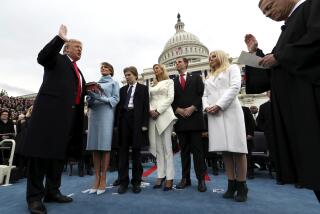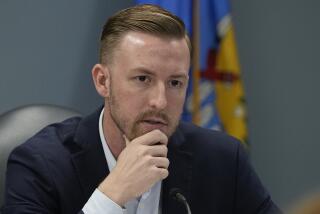‘I DO SOLEMNLY SWEAR . . . ‘
Although he was a devout Christian, John Quincy Adams took his presidential oath upon a “Volume of Laws” because, he wrote in a March 1825 diary entry, it was the Constitution he swore to preserve, protect and defend.
But Adams is the exception.
Save for some presidents who were sworn in privately on a weekend or hastily upon their predecessor’s death, all of the others have placed their hands on a Bible -- or at least on something considered holy.
Lyndon B. Johnson took his oath upon a missal, a Catholic liturgical book. Sworn in aboard Air Force One after John F. Kennedy’s assassination in 1963, Johnson used a copy found on a side table in the president’s airplane bedroom.
When he began his second term, in 1965, he returned to the family Bible he had used for his vice presidential inauguration.
Many presidents select a Bible that holds personal or historical significance.
When Barack Obama takes the presidential oath of office Tuesday, he will place his hand on the same Bible that Abraham Lincoln used at his inauguration in 1861.
Obama will be the first incoming president to use the 156-year-old Lincoln Bible, which is bound in burgundy velvet and has heavily gilded edges.
The Constitution does not require a Bible, but like many practices on Inauguration Day, it’s tradition.
“So help me God,” for example, is not part of the presidential oath, but many presidents add the words. Many historians think George Washington was the first to use the phrase, but Donald R. Kennon, a historian at the United States Capitol Historical Society, said there was little evidence to support the idea.
Well documented, however, is the Bible that the first president used for his oath.
Four chief executives -- Warren G. Harding, Dwight D. Eisenhower, Jimmy Carter and George H.W. Bush -- have sworn upon the Bible that Washington used at the first presidential inauguration in 1789.
This particular tome was a late addition to the festivities. Because a Masonic lodge played a role in the ceremony, held at Federal Hall in New York, the group continues to recount the story. In 1918, Adolph Geering, once a master of St. John’s Masonic Lodge in New York, said, “Everything was ready for the administration of the oath of office.”
But there was no Bible.
New York Chancellor Robert Livingston, who was to administer the oath, and the inaugural parade marshal were both Freemasons, like many early American leaders. The marshal retrieved a Bible from the altar of their nearby lodge so the oath could begin.
The chief justice of the United States typically administers the presidential oath, but that didn’t happen with Washington: There was no Supreme Court yet.
There’s a story as well behind the Lincoln Bible.
With the threat of civil war looming, Lincoln came to Washington in secret because many feared there would be threats on his life, said Jennifer Gavin, a spokeswoman for the Library of Congress. Because of his quiet arrival in 1861, many of Lincoln’s belongings -- including his family Bible -- were still en route from Springfield, Ill., she said.
The 1,280-page Bible used by Lincoln was purchased by Supreme Court clerk William Thomas Carroll. The cover bears a shield of gold wash over white metal with the words “Holy Bible.”
The high court’s clerks often provided a Bible for the ceremony. William Howard Taft, who after his presidency would, as chief justice, administer the oath for Calvin Coolidge in 1925, swore upon a Bible that had belonged to the court for a century.
Kennon, the historian, said few records existed about what Bibles, if any, America’s earliest presidents used at their inaugurations. Taking an oath upon a Bible might have been “so commonplace that it didn’t merit mention,” he said.
Because Bibles quickly become the inaugural status quo, “if you didn’t do it, then people would ask questions.” Indeed, presidential histories still note that Franklin Pierce broke precedent in 1853 by not kissing the Bible.
Families, and particularly mothers, have provided many an inaugural Bible.
Grover Cleveland received his little red Bible in 1852, when he was 15. Dwight D. Eisenhower was given his upon graduating from West Point, and Bill Clinton’s grandmother provided his holy book.
Coolidge, Kennedy, Richard Nixon and Ronald Regan used Bibles from the maternal sides of their families.
Some family Bibles were passed down several generations before they made their inaugural debut.
Franklin D. Roosevelt took all six of his oaths (four as president, two as New York governor) with his hand upon the same Dutch family Bible that dated to 1673.
A brown, leather-bound Bible used by Nixon had been in his mother’s family since 1873. Nixon placed one family Bible on top another, both opened to a famous passage from Isaiah -- “and they shall beat their swords into plowshares.”
Nixon selected the verse because he wanted to be remembered as a peacekeeper, said Olivia Anastasiadis, a curator at the Richard Nixon Presidential Library and Museum in Yorba Linda.
Others also doubled up: Eisenhower, Carter and Bush all used the Washington Bible along with a family Bible.
George W. Bush had hoped to use the Washington Bible as well in 2001. Although the Bible was transported under guard from New York for the ceremony, it was kept indoors because of the cold and rainy weather. Bush used a family Bible instead.
--
More to Read
Sign up for Essential California
The most important California stories and recommendations in your inbox every morning.
You may occasionally receive promotional content from the Los Angeles Times.









